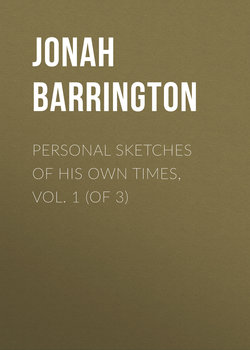Читать книгу Personal Sketches of His Own Times, Vol. 1 (of 3) - Jonah Barrington - Страница 10
A DUBLIN BOARDING-HOUSE
ОглавлениеSketch of the company and inmates – Lord Mountmorris – Lieut. Gam Johnson, R. N. – Sir John and Lady O’Flaherty – Mrs. Wheeler – Lady and Miss Barry – Memoir and character of Miss Barry, afterward Mrs. Baldwin – Ruinous effects of a dramatic education exemplified – Lord Mountmorris’s duel with the Honourable Francis Hely Hutchinson at Donnybrook – His Lordship wounded – Marquis of Ely, his second.
After my return to Dublin from the Temple, before I could suit myself with a residence to my satisfaction, I lodged at the house of Mr. Kyle, in Frederick-street, uncle to the present provost of Dublin University. Mrs. Kyle was a remarkably plain woman, of the most curious figure, being round as a ball; but she was as good as she was ordinary. This worthy creature, who was a gentlewoman by birth, had married Kyle, who, though of good family, had been a trooper. She had lived many years, as companion, with my grandmother, and, in fact, regarded me as if I had been her own child.
In her abode so many human curiosities were collected, and so many anecdotes occurred, that, even at this distance of time, the recollection amuses me. Those who lodged in the house dined in company: the table was most plentifully served, and the party generally comprised from eight to ten select persons. I will endeavour to sketch the leading members of the society there at the period of which I speak; and first on the list I will place the late Lord Mountmorris, of celebrated memory. He was a very clever and well-informed, but eccentric man; – one of the most ostentatious and at the same time parsimonious beings in the world. He considered himself by far the greatest orator and politician in Europe; and it was he who sent a florid speech, which he intended to have spoken in the Irish House of Lords, to the press: – the debate on which it was to be spoken did not ensue; but his Lordship having neglected to countermand the publication, his studied harangue appeared next day in the Dublin newspapers with all the supposititious cheerings, &c. duly interposed! I believe a similar faux pas has been committed by some English nobleman.
His Lordship, at the period in question, was patronising what is commonly ycleped a led captain– one Lieutenant Ham or Gam Johnson, of the royal navy, brother to the two judges and the attorney. He was not, however, a led captain in the vulgar application: he was an independent-minded man, and a brave officer; but, like many others, sought for patronage because he could not get on without it. Though not absolutely disgusting, Lieut. Johnson was certainly one of the ugliest men in Christendom. It was said of him that he need never fire a shot, since his countenance alone was sufficient to frighten the bravest enemy. His bloated visage, deeply indented by that cruel ravager of all comeliness, the smallpox, was nearly as large as the body which supported it, and that was by no means diminutive. Yet he was civil and mild, and had, withal, a much higher character as an officer than his captain in the Artois frigate, Lord Charles Fitzgerald, who, it was at that time thought, conceived that a sound nap was as good as a hard battle.
Next in the company came Sir John O’Flaherty, Bart. (whose brother had been poisoned by Lanegan), and Lady O’Flaherty his sposa. He was a plain, agreeable country gentleman. Her Ladyship was to the full as plain, but not quite so agreeable. However, it was (as Mrs. Kyle said) a very respectable thing, at a boarding-house, to hear – “Sir John O’Flaherty’s health!” – and “Lady O’Flaherty’s health!” – drunk or hobnobbed across the table. – They formed, indeed, excellent stuffing to cram in between my Lord Mountmorris and the simple gentry.
Lady Barry, widow of the late Sir Nathaniel Barry, Bart., and mother of Sir Edward, (who was also an occasional guest,) follows in my catalogue, and was as valuable a curiosity as any of the set. – She, too, was a good ingredient in the stuffing department.
Mrs. Wheeler, the grandmother of Sir Richard Jonah Denny Wheeler Cuffe, a cousin of mine, gave up her whole attention to lap-dogs; and neither she nor the last-mentioned dowager were by any means averse to the fermented grape – though we never saw either of them “very far gone.”
Lady Barry’s only daughter, afterward Mrs. Baldwin, was also of the party. Though this young female had not a beautiful face, it was peculiarly pleasing, and she certainly possessed one of the finest of figures, – tall, and slender in its proportions, and exquisitely graceful. Her father, Sir Nathaniel Barry, many years the principal physician of Dublin, adored his daughter, and had spared neither pains nor expense on her education. She profited by all the instruction she received, and was one of the most accomplished young women of her day.
